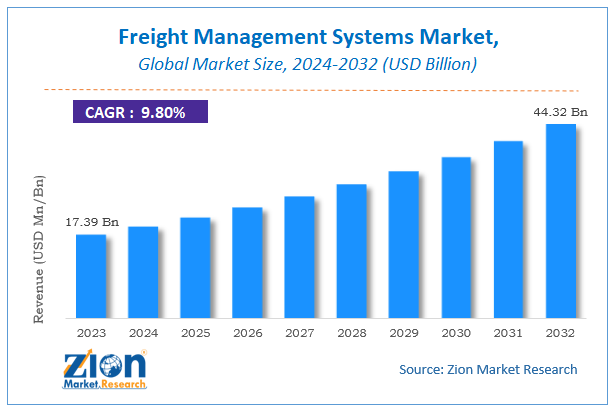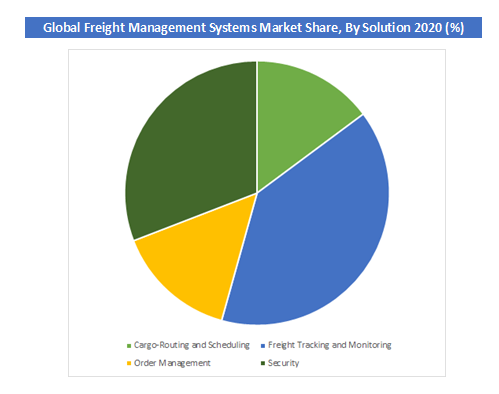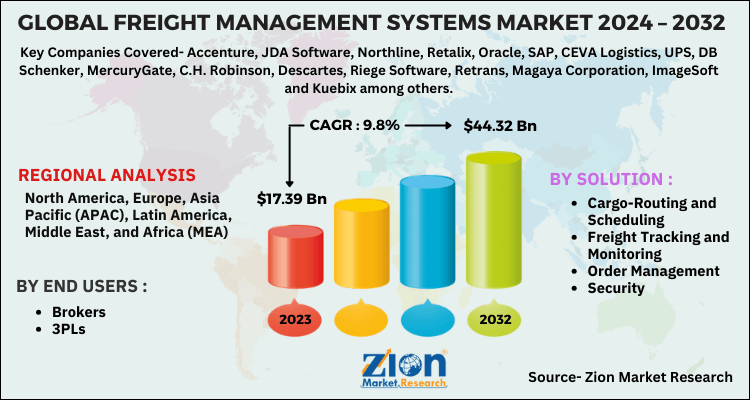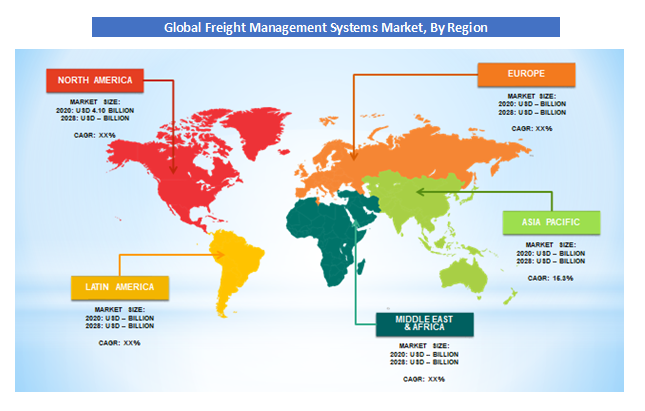Freight Management Systems Market Size, Share, Trends, Growth and Forecast 2032

Freight Management Systems Market By Solution (Cargo Routing and Scheduling, Freight Tracking and Monitoring, Order Management, Security and others), By End- user (Brokers, 3PLs and others): Global Industry Perspective, Comprehensive Analysis, and Forecast, 2024-2032
| Market Size in 2023 | Market Forecast in 2032 | CAGR (in %) | Base Year |
|---|---|---|---|
| USD 17.39 Billion | USD 44.32 Billion | 9.8% | 2023 |
Freight Management Systems Market Insights
Zion Market Research has published a report on the global Freight Management Systems Market, estimating its value at USD 17.39 Billion in 2023, with projections indicating that it will reach USD 44.32 Billion by 2032. The market is expected to expand at a compound annual growth rate (CAGR) of 9.8% over the forecast period 2024-2032.
The report explores the factors fueling market growth, the hitches that could hamper this expansion, and the opportunities that may arise in the Freight Management Systems Market industry. Additionally, it offers a detailed analysis of how these elements will affect market demand dynamics and market performance throughout the forecast period.
Freight Management Systems Market: Overview
Freight Management is the overall process of overseeing and managing the delivery of goods. It is a part of the logistics process that covers the whole supply chain operation from warehousing to inventory control and managing supplier relationships. Freight Management systems are detailed and robust SaaS systems that allow the user to carry out critical tasks dealing with procurement and management of shipping services. The market is primarily driven by the growth of free trade policy for different countries that are increasing the business of imports and exports across the globe. Nowadays, big data analytics is the biggest opportunity in the generation of freight management systems. With technological advancements, organizations today generate large amounts of data and big data analytics bring real value to improve freight operational efficiencies and customer satisfaction.
To know more about this report, request a sample copy.
Growth Factors
The major driver for Freight Management Systems is the growth of the free trade policy between the countries that are increasing the business of imports and exports across the globe. Companies have been shifting towards technologies that help, track, secure and control their in-transit cargo. These management systems offer the end-to-end supply chain visibility of the process. Visibility helps to improve inventory management and minimize supply chain errors by providing the data required by any stakeholder at any point in time. The increasing adoption of this software by companies, in order to improve their delivery capabilities, is also a factor in the demand for freight management systems.
The increase in global trade is also one of the factors for the demand for freight management systems. The growing investment overseas by the organizations is demand for more freight management systems. The global e-commerce industry will also propel the market to ensure the planned inventory management along with on-time delivery of products to the consumers. The emergence of cloud and big data analytics along with the M2M communication will also make freight companies adopt freight management solutions.
Freight Management Systems Market: Report Scope
| Report Attributes | Report Details |
|---|---|
| Report Name | Freight Management Systems Market |
| Market Size in 2023 | USD 17.39 Billion |
| Market Forecast in 2032 | USD 44.32 Billion |
| Growth Rate | CAGR of 9.8% |
| Number of Pages | 136 |
| Key Companies Covered | Accenture, JDA Software, Northline, Retalix, Oracle, SAP, CEVA Logistics, UPS, DB Schenker, MercuryGate, C.H. Robinson, Descartes, Riege Software, Retrans, Magaya Corporation, ImageSoft and Kuebix among others |
| Segments Covered | By Solution, By End Users and By Region |
| Regions Covered | North America, Europe, Asia Pacific (APAC), Latin America, Middle East, and Africa (MEA) |
| Base Year | 2023 |
| Historical Year | 2018 to 2022 |
| Forecast Year | 2024 - 2032 |
| Customization Scope | Avail customized purchase options to meet your exact research needs. Request For Customization |
Solution Analysis Preview
The Order Management segment forms a significant part of the solution segment of Freight Management Systems. An order management system is a digital way that manages the lifecycle of an order. It tracks all the information and processes, inventory management, and manages order entry, fulfillment, and after-sales service. In order to streamline all the processes in a proper fashion in the organizations, build flexible growth for the processes involved and improve the customer experience organizations on large scale prefer order management systems the freight management systems. As it forms the heart of all the operational platforms and also integrates the enterprise resource planning (ERP) system, commerce system, and product information system, it is in great demand in organizations.
Freight Management Solutions offers security while managing the freight in the transport. Security has become a major concern in transport because of the risk of consignments being tampered with, suffering a criminal attack,s and the risk of goods being used for terrorism or any illegal purposes. The Freight Management Systems tools are aimed at receiving accurate information about goods and transport in advance and are also helpful in tracking the freight containers and all transport processes involved, thus ensuring proper security.
End User Preview
The 3PL segment forms a significant segment of the end user of the Freight Management Systems Market. The 3PL or third-party logistics is the process of outsourcing e-commerce logistics processes to a third-party business, including warehousing, inventory management, and fulfillment. The 3PL companies have been increasingly using freight management systems which help them in cost reduction, scalability, and risk management and integrate the key systems in the processes. The growth in the world trade volumes and the overall globalization are the factors expected to provide opportunities to logistics service providers.
Freight Management Systems Market: Segmentation
By Solution (Cargo Routing and Scheduling, Freight Tracking and Monitoring, Order Management, Security and others),
By End- user (Brokers, 3PLs and others)
To know more about this report, Request For Customization.
Regional Analysis Preview
North America held a share of 37% in 2020. It is supposed to be one of the highest revenue-generating regions for this market during the forecasted period. This is due to the fact that there has been high demand and there are many users who have adopted the freight management systems. Also, the high technological adoption and the presence of leading solution providers in the market is the reason for the high demand. Due to the factors such as good sustainability and a well-established economy, which is leading to increasing investments in Research and Development activities, there has been the development of new technologies and use cases, leading to the increased usage of these systems.
Asia-Pacific is expected to have a CAGR of 15.3% from 2021 to 2032. This is mainly due to emerging advanced modules in freight management systems leading to improved delivery capabilities. Also, the demand for the on-time delivery of products and raw materials has grown leading to fleet owners implementing freight management systems. The warehouse efficiencies get improved as the time spent on freight management systems gets reduced, due to the usage of freight management systems.
Key Market Players & Competitive Landscape
Some of the key players in the Freight Management Systems Market include-
- Accenture
- JDA Software
- Northline
- Retalix
- Oracle
- SAP
- CEVA Logistics
- UPS
- DB Schenker
- MercuryGate
- C.H. Robinson
- Descartes
- Riege Software
- Retrans
- Magaya Corporation
- ImageSoft and Kuebix among others.
In 2018, Descartes acquired Aljex Software, which is a cloud-based provider of back office transportation management solutions for transportation providers. The acquisition was mainly carried out to scale Descartes network with additional transactions related to capacity planning, booking, and settlement processes.
The Global Freight Management Systems Market is segmented as follows:
By Solution
- Cargo-Routing and Scheduling
- Freight Tracking and Monitoring
- Order Management
- Security
By End Users
- Brokers
- 3PLs
By Region
- North America
- The U.S.
- Canada
- Europe
- France
- The UK
- Spain
- Germany
- Italy
- Rest of Europe
- Asia Pacific
- China
- Japan
- India
- South Korea
- Southeast Asia
- Rest of Asia Pacific
- Latin America
- Brazil
- Mexico
- Rest of Latin America
- Middle East & Africa
- GCC
- South Africa
- Rest of Middle East & Africa
Table Of Content
Methodology
FrequentlyAsked Questions
Freight Management Systems Market market size valued at US$ 17.39 Billion in 2023
Freight Management Systems Market market size valued at US$ 17.39 Billion in 2023, set to reach US$ 44.32 Billion by 2032 at a CAGR of about 9.8% from 2024 to 2032
Some of the key factors driving the Global Freight Management Systems Market growth are the growth of the free trade policy between the countries that is increasing the business of imports and exports across the globe, companies shifting towards technologies that help, track, secure and control their in-transit cargo. These management systems offer the end-to-end supply chain visibility of the process. Visibility helps to improve the inventory management and minimize supply chain errors by providing the data required by any stakeholder at any point of time. The increasing adoption of this software by the companies, in order to improve their delivery capabilities, is also the factor for the demand of freight management systems.
North America held a share of 37% in 2020. It is supposed to be one of the highest revenue-generating regions for this market during the forecasted period. This is due to the fact that there has been high demand and there are many users who have adopted the freight management systems. Also, the high technological adoption and the presence of leading solution providers in the market is the reason for the high demand. Due to the factors such as good sustainability and well-established economy, which is leading to the increasing investments in the Research and Development activities, there have been development of new technologies and use cases, leading to increased usage of these systems.
Some of the key players in the Freight Management Systems Market include Accenture, JDA Software, Northline, Retalix, Oracle, SAP, CEVA Logistics, UPS, DB Schenker, MercuryGate, C.H. Robinson, Descartes, Riege Software, Retrans, Magaya Corporation, ImageSoft and Kuebix among others.
Choose License Type
List of Contents
Market InsightsOverviewTo know more about this report, request a sample copy.Growth FactorsReport ScopeSolution Analysis PreviewEnd User PreviewMarket: SegmentationTo know more about this report, Request For Customization.Regional Analysis Preview Key Market Players Competitive LandscapeRelatedNews
HappyClients
Zion Market Research
Tel: +1 (302) 444-0166
USA/Canada Toll Free No.+1 (855) 465-4651
3rd Floor,
Mrunal Paradise, Opp Maharaja Hotel,
Pimple Gurav, Pune 411061,
Maharashtra, India
Phone No +91 7768 006 007, +91 7768 006 008
US OFFICE NO +1 (302) 444-0166
US/CAN TOLL FREE +1 (855) 465-4651
Email: sales@zionmarketresearch.com
We have secured system to process your transaction.
Our support available to help you 24 hours a day, five days a week.
Monday - Friday: 9AM - 6PM
Saturday - Sunday: Closed









